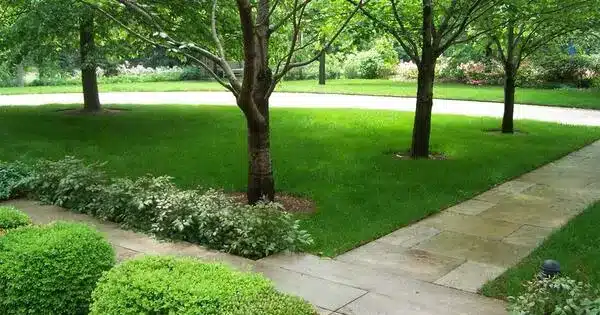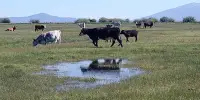Organic lawn management, also known as organic turf management, organic land care, or organic landscaping, is the practice of establishing and caring for an athletic turf field or garden lawn and landscape using organic horticulture, without the use of manufactured inputs such as synthetic pesticides or artificial fertilizers. It refers to the process of keeping a healthy and attractive lawn using natural and ecologically friendly ways that do not include the use of synthetic chemicals or pesticides.
It is a component of organic land care and organic sustainable landscaping that applies the principles and practices of sustainable gardening and organic farming to the upkeep of lawns and gardens. It promotes soil health, biodiversity, and sustainability.
Here are some key principles and practices of organic lawn management:
- Soil Testing: Start by conducting a soil test to determine its pH and nutrient levels. This helps you understand the specific needs of your lawn and what amendments might be necessary.
- Organic Fertilization: Instead of synthetic fertilizers, use organic alternatives such as compost, well-rotted manure, or organic fertilizer blends. These materials improve soil structure and provide nutrients gradually.
- Grass Selection: Choose grass varieties that are well-suited to your local climate and soil conditions. Native or drought-resistant grasses can reduce the need for water and maintenance.
- Proper Mowing: Set your mower blades to the appropriate height for your grass type. Taller grass shades the soil, reducing weed growth and conserving moisture.
- Watering: Water deeply and infrequently to encourage deep root growth. Early morning is the best time to water to minimize evaporation. Consider installing a rain barrel to collect rainwater for irrigation.
- Organic Pest Control: Encourage natural predators like ladybugs and birds to help control pests. You can also use organic pest control methods like neem oil, diatomaceous earth, or insecticidal soap for specific problems.
- Overseeding: Overseed your lawn with grass seeds appropriate for your region and soil type. This helps thicken the turf and crowd out weeds.
Identify and manage pest problems using IPM tactics. This includes inspecting your lawn, identifying pests, and employing the least destructive pest management measures. Use of synthetic herbicides, insecticides, and chemical fertilizers should be avoided since they can affect beneficial insects, pollinators, and the ecosystem.
Because organic lawn care relies on natural processes, it may take some time to produce benefits. Be persistent and patient in your endeavors. To reduce upkeep and resource use, consider sustainable lawn alternatives such as native plantings, ground covers, or lowering the size of your lawn.
















